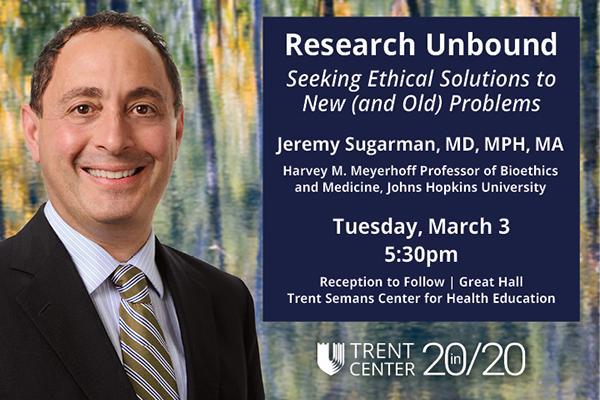
Endowed Lectureships
Jeremy Sugarman, MD, MPH, MA, Harvey M. Meyerhoff Professor of Bioethics and Medicine, Johns Hopkins University
Reception to follow. Open to the public.
Recent controversies such as the birth of the first gene-edited babies in China, unchecked uses of unproven stem cell-based therapies, clinical trials conducted without patient consent, and HIV research with vulnerable populations challenge existing approaches aimed at ensuring that research is ethically sound. New and creative solutions are needed to appropriately manage research that seems to be unbound.
Prior to joining the faculty at Johns Hopkins, Jeremy Sugarman, MD, MPH, MA was a professor of medicine and philosophy at Duke University. In 2000, he was the founding director of the Trent Center for Bioethics, Humanities & History of Medicine.
An internationally recognized leader in the field of biomedical ethics, Dr. Sugarman has particular expertise in applying empirical methods and evidence-based standards for evaluating and analyzing bioethical issues. His contributions to both medical ethics and policy include his work on the ethics of informed consent, umbilical cord blood banking, stem cell research, international HIV prevention research, global health and research oversight. He is the author of over 350 articles, reviews and book chapters and has edited or co-edited four books (Beyond Consent: Seeking Justice in Research; Ethics of Research with Human Subjects: Selected Policies and Resources; Ethics in Primary Care; and Methods in Medical Ethics).
Dr. Sugarman served as senior policy and research analyst for the White House Advisory Committee on Human Radiation Experiments, consultant to the National Bioethics Advisory Commission, and Senior Advisor to the Presidential Commission for the Study of Bioethical Issues. He has been elected as a member of the American Society of Clinical Investigation, Association of American Physicians, and the National Academy of Medicine (formerly the Institute of Medicine) and is a fellow of the American Association for the Advancement of Science, the American College of Physicians and the Hastings Center.
The Nancy Weaver Emerson Lectureship in Medical Ethics was established in 1997 to honor Nancy Weaver Emerson whose legacy shows us that patients can be our most courageous and extraordinary partners in advancing research, treatment, education and policy.